Berlinale Film Stars Show Solidarity With Iran Protests
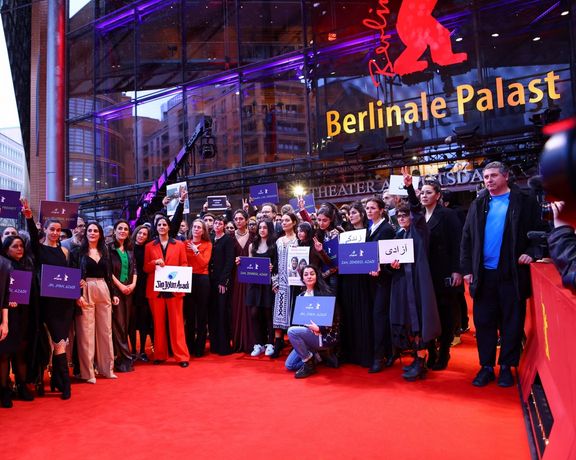
Dozens of actors and filmmakers gathered on the Berlinale's red carpet on Saturday to show solidarity with anti-government protesters in Iran.

Dozens of actors and filmmakers gathered on the Berlinale's red carpet on Saturday to show solidarity with anti-government protesters in Iran.
An exiled Iranian film director predicted the imminent fall of the country's government.
"The regime's time is over," Sepideh Farsi told Reuters on the red carpet. "It's time for change – I think people really grasp that."
Some of those present at the demonstration – including Farsi, whose animation film "The Siren" opened on Thursday, and the award-winning director Farzad Pak – held up placards emblazoned with the Kurdish revolutionary slogan "Jin, Jîyan, Azadî" (Woman, Life, Freedom).
Others made victory signs or chanted the slogan as they punched the air with their hands.
The demonstration in Berlin came after protests flared up overnight on Thursday in Iran, with streets in a number of cities filling with people demanding the overthrow of the Islamic Republic.
The Berlinale has this year boycotted Iranian film institutions but is showing a number of films by independent directors from the country, with Iran's quest for freedom one of this year's main themes.
Banning Iranian institutions sent "a very strong signal," Farsi added. "Iranian institutions have always been here; their absence opens the place for other independent institutions."
The demonstration followed a panel discussion exploring the role of the arts in the protests, during which Pak described the government as a "totalitarian regime where self expression is not allowed".
Iranian director Jafar Panahi, who has been critical of the government, was arrested in Iran in July. He was released on bail earlier this month.
Reporting by Reuters
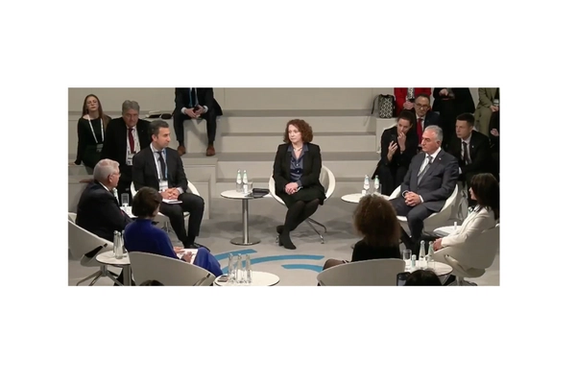
Iran’s exiled Prince Reza Pahlavi said in Munich that his country can play a positive role in the world if opposition forces get support from friendly countries.
Pahlavi told the Munich Security Conference on Saturday that the people of Iran are united and they expect the international community to support their ideals.
Women’s rights activists Masih Alinejad and British-Iranian actress and human rights activist Nazanin Boniadi as well as Hannah Neumann, a member of the European Parliament, and Bob Menendez, Chairman of the US Senate Foreign Relations Committee, also spoke at a meeting called “Woman, Freedom, Life: Visions for Iran” on the second day of the conference.
Pahlavi told the forum that “We need to make a transition as fast as possible because the opportunity costs grow every day that goes by — it becomes more and more costly for Iranians and not just for us but the rest of the world.”
Elsewhere in his remarks, he said millions of Iranians, who have fled the country since the Islamic Revolution to become German, French, Canadian, and US citizens can be back home serving their homeland.
“What keeps them from contributing is a regime that doesn't even listen to them because they're not interested in the welfare of Iran,” he noted.
He called on the West to work with a different Iran, arguing that “a different Iran would mean that you will have true allies who believe in the very same principles of human rights and liberty.”
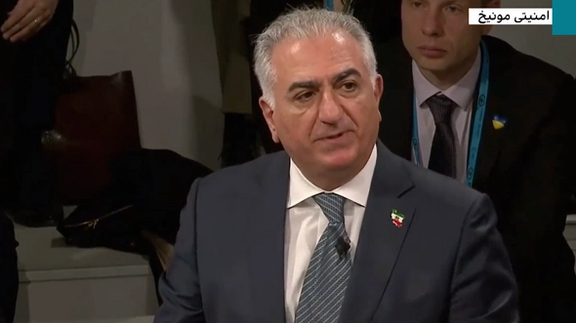
“So, the minute this regime disappears, not only you instantaneously eliminate the combination of the problems that this regime has cumulatively created in four decades, but the replacement or the people who think like you and want to work with you.”
He added that a secular free Iran can satisfy the energy concerns that the West has, where Iran can be the greatest provider.
Talking about the significance of inviting Iranian opposition to the Munich Security Conference he stated that “this is a perfect opportunity as we engage with parliamentarians or leaders of different governments to discuss what exactly can be done besides maximum pressure.”
"We are also hoping to have maximum support for the people in Iran … in areas that can be immediately done, for instance, internet access or a strike fund to support striking workers and the funding of it."
Pahlavi said what Iran needs is solidarity in the principles that people are fighting for, raising hope that the countries who hold talks with Iranian representatives understand that their task is to be unified.
Alinejad also said she is very happy that for the first time she will not see dictators from Iran at the Munich Security Conference and the conference has invited people's representatives.
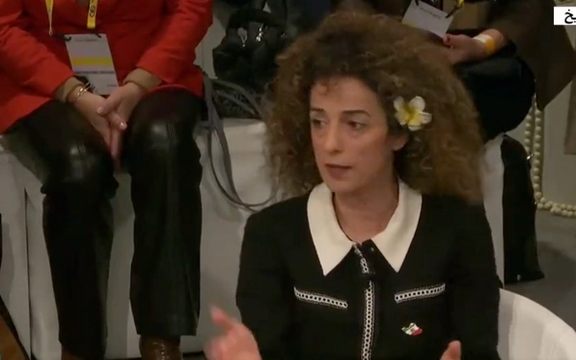
Talking about the uprising of the Iranian people against the regime, Alinejad said “clearly, we're not just fighting against compulsory hijab. As we all know, compulsory hijab is the main pillar of a religious dictatorship.”
“Compulsory hijab is like the Berlin Wall. If we tear this wall down, the religious dictator with Islamic Republic will be gone. So, women are in the streets, shoulder to shoulder with men. They're saying that enough is enough…Counting women like second class citizens, killing, torturing, assassinating is in the DNA of the Islamic Republic. And that is why this protest is taking place across Iran, to bring the Islamic Republic down.”
“We want the West to stop shaking the hand of this murderous regime. We want the West to stop saving this regime. In 2009 people were in the streets calling on Obama to support them, but at the same time, Obama's administration was trying to get a [nuclear] deal.”
She stressed that it has been two decades European countries trying to have a deal with Iran, but so far they have achieved nothing.
“This is the time that the Europeans, Americans, they have to sign a deal with Iranians, with the people of Iran, not with the government... The plan B is very, very clear now. Iranians want regime change. We don't want you to say regime change if you're scared of the word. But this is very, very important to stand on the right side of the history.”
Alinejad also warned that if the West does not take strong action against the Islamic Republic, the IRGC is going to come on US and European soil and assassinate non-Iranians.
“Believe me, people of Iran are better allies than these backward mullahs. You can count on us.”
She underscored that Iran without the Islamic Republic can be a better place and it can help the rest of the world to be safe.
“We are ready to have an Iran without the Islamic Republic. We are wondering whether the West is ready or still they sanction the Revolutionary Guard, the clerics and the other day they want to negotiate with this murderous regime. Be ready for an Iran without Islamic Republic.”
Talking about the 2015 nuclear deal known as the JCPOA, Alinejad said after the deal, its economic benefit did not go to the people of Iran but instead to the dictators.
“The benefit of the deal went to the terrorist organizations, to Hamas, to Hezbollah, to Bashar Assad, to Hassan Nasrallah. So clearly, we do not want the West to sanction the people of Iran,” underlining that she strongly believes a strategic sanction can help.

For her part, Nazanin Boniadi emphasized that women played a central role in the recent movement reiterating that Iranians have become accustomed to mass uprisings nearly once a decade for the past 40 years, but nothing really compares in fervor or magnitude to what has been seen in the past five months.
“Of course, people are out on the streets, as they've been in the past few years opposing the Supreme Leader, Ali Khamenei. But not only that, they're now tearing down and burning photos, knocking down effigies of the founder of the Islamic Republic, Ayatollah Khomeini, and Qasem Soleimani, but really, the thing that sets these protests apart is that it's female led.”
She said the spark and the engine of the protests have been women because of the murder in custody of Mahsa Amini.
“Courage has been contagious and really what women have managed to do in Iran has galvanized Iranian society at large to understand gender equality and every other basic human rights. And it has turned into a pro-democracy movement and really the greatest threat to the Islamic Republic that we've seen in 44 years.”
Elsewhere in her statements Boniadi said the reform movement is dead in Iran and it is just not possible. She also added that the very pillars that keep the system up in Iran ensure that it's wrongs cannot be made right.
She also added that Iranian people are not looking for foreign intervention, but support and those two things are completely separate.
In this panel, Senator Bob Menendez, emphasized the difference between this uprising of the Iranian people and the previous periods of protests saying that this difference stems from the leadership of the movement by women.
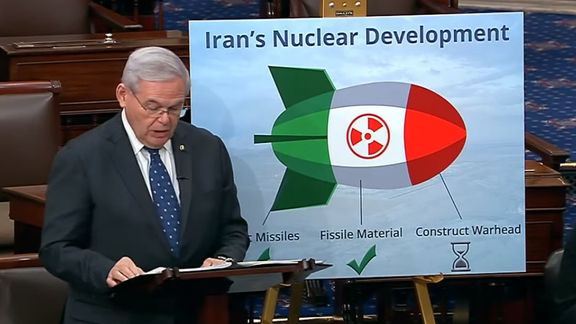
Highlighting that the international community should support people's protests, he called the uprising of the Iranian people an “opportunity”.
“I do believe that this process is an opportunity if we grab it. We lost the green revolution (Green Movement). We cannot lose another one…. I think the international community needs to wake up to the tear gas and start acting resolutely against the regime on behalf of the Iranian people. This can be a defining moment for a difference.”
The Senator from New Jersey said he did not vote for the first nuclear agreement with Iran because he thought it was a mistake noting that the deal known as the JCPOA did nothing about Iran's other “nefarious” activities.
“It did nothing about its missile development, did nothing about the destabilization of its neighbors and the region. It did nothing about its proxies, violent proxies in different parts of the world and it did nothing about violating the human rights of its own people.”
Menendez added that the iteration of the deal that was being contemplated did not make any sense, because it was even worse than the first deal.
He further raised hope that the Europeans would join the United States in sanctioning the regime entities because they should understand that only sanctions against regime leaders can work so that the people are not hurt.
Hanna Neumann, the representative of Germany in the European Parliament, also said that the protests showed “how brutal this regime is towards its own citizens.”
Neuman said the European Parliament has been very clear regarding its stance towards the Islamic Republic, but on the other hand, “for the celebrations of the 44th anniversary of the revolution, we had the ambassadors of Hungary and Poland shaking hands with President Raisi.”
“We have those who are very clear saying this regime does not represent the people of Iran anymore. And we have those who still try to figure out how to deal with the regime. And it's an internal debate that we're having. But I really have the impression it's shifting more. The more we can see what could the alternative vision be,… the more I think we see a shift,” she stressed.

A prominent Iranian economist in a letter meant to reach Supreme Leader Ali Khamenei has said that the Islamic Republic is in the final stage of its downfall.
Mohsen Renani, a professor at Isfahan University, says that he gave his paper to former foreign minister Mohammad Javad Zarif to hand it to Khamenei some two months ago, but after a while Zarif came back and said he was unable to deliver the letter to Khamenei. Renani decided to publish it on the social media platforms Telegram.
In the letter he argued that the downfall of any entity or political or social structure has four stages, and its collapse happens with the fourth stage. He further argued that the Islamic Republic is now at stage 4 and it is not quite clear for how long it can resist the collapse.
Furthermore, Renani warned that attempting to bring about a revolution from the top to avoid the downfall will add to the probability of a collapse.
According to Renani, the downfall of any institution or government has two dimensions and four stages which take place one after another: The first dimension, is the subjective downfall which includes the two stages of collapse of efficiency and collapse of competency. The second dimension, the objective downfall, consists of the two stages of collapse of symbols and collapse of structures.
Likening the society to a family, Renani said that the subjective collapse takes place when one or both sides are disappointed by the other and their emotional relationship collapses like an emotional divorce. But when the family really collapses, and a separation takes place there is an objective collapse or a legal divorce. Now the members of the family have realized that the father figure is not capable of solving the family's economic and social problems. Then his competency collapses.
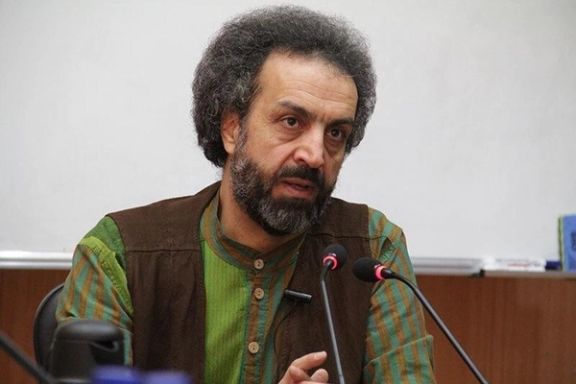
Iran, according to Renani has left behind the first three stages and is now in the final stage, that is the collapse of its structures. He argued: "We all know that Iran will go through a stage of transition from the current impasse, but we need to make sure that the government will choose the least costly way of transition. It depends on the government to relive the experience of South Africa and Chile, or the ones that happened to Libya and Syria. Iran's national interests call for thinking of a violent revolutionary development is the very last choice."
He added: "I publish this text to tell the families who have suffered during the protests and their children that their movement has had a great achievement. I also wish to tell those inside the system who wish to take a closer realistic look at the situation that perhaps there is still time to save the country."
Renani warned that a revolution from the bottom is inevitable. It can be averted only if change starts from the top, if there is still time for that. The government should not be deceived by relative calm. Instead of suppressing and humiliating the new generation, the government should consider understanding and respecting it and holding a dialogue with it.
It is only in that case that bringing about a change in the structure can facilitate Iran's future development in a less costly way. However, at the current stage even a reform from the top may not be able to save the system as it has lost its all credibility. Nonetheless, it is the only thing that can be done at this stage if the system can restore its credibility among the people, Renani said.
"I know that publishing this paper may enrage the government or it may make angry those Iranians who think a violent regime change is the only solution for Iran's crisis, but as an intellectual it is my responsibility to warn both sides," Renani reiterated.
Earlier, former Prime Minister Mir Hossein Mousavi had called for a regime change and former reformist President Mohammad Khatami said that reformists have no future in Iran although moving toward a regime change might lead to violence and chaos in Iran. The reform camp supported Khatami's view and some seventy politicians expressed their support for Mousavi's idea although he did not offer a roadmap for the next steps.
In Renani's model, following the decline of legitimacy and symbolism, i.e., when parents no longer maintain cordial relations with children, the structure of the system, here the family, also collapses and the family no longer live under the same roof. "The Islamic Republic, I believe, is standing on the threshold of this final stage," Renani maintained.
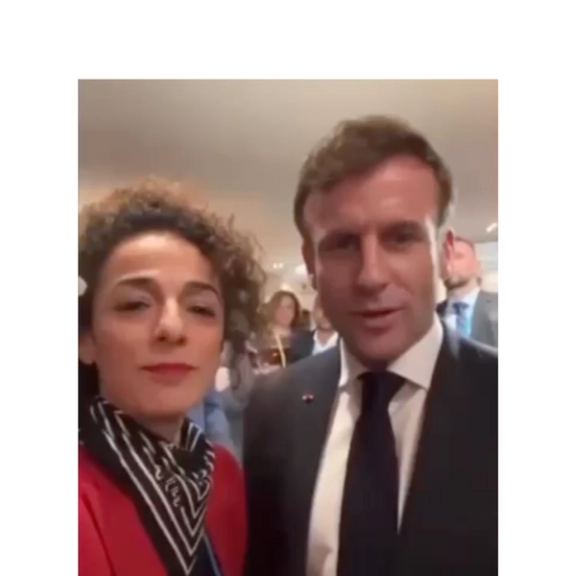
The Islamic Republic has lashed out at French President Emmanuel Macron for his meeting with famous US-based Iranian activist Masih Alinejad.
Foreign Ministry Spokesman Nasser Kanaani said in a tweet Saturday that “those who ignore 44 years of overwhelming support of majority of Iranians in for the country [Islamic Republic], and go to a few anonymous clowns, neither believe in democracy nor know the revolution and the Iranian nation.”
He further made a threat saying, “Soon you will kneel before the perseverance, strength and greatness of the Iranian nation.”
On the sidelines of the Munich Conference on Friday, Emmanuel Macron had a friendly encounter with women’s rights activist Alinejad, one of eight dissident figures who have formed a coalition to support the protests in Iran.
During the short conversation, a video of which was published in Alinejad’s twitter account, Macron said that “I want to congratulate you and all the members of the coalition for joining and teaming up nicely...”
The French president praised a united front among eight leading Iranian opposition figures formed earlier in February, promising to meet with the group.
Three members of the group, Prince Reza Pahlavi, Masih Alinejad and Nazanin Boniadi are participating in the Munich Security Conference, while Iranian officials have not been invited.
The dissident leaders have been participating in events around the world to make the voice of the Iranian opposition heard. Such events signal the emergence of a leadership council in the diaspora to campaign for international support in favor of Iran’s protest movement.
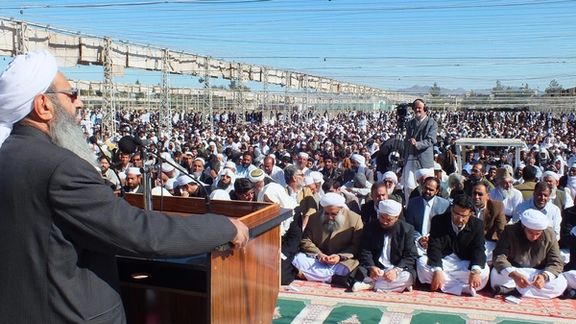
Iran's most prominent Sunni leader Mowlana Abdolhamid has once again called for a referendum in the country, saying people's wish for a secular government must be met.
During his Friday prayer sermon, the outspoken Sunni leader continued to challenge the Islamic Republic and its ruler Ali Khamenei by demanding submission to the popular will, saying that an Islamic government must be democratic according to practices in the early years of Islam.
Pointing to the ongoing disagreement between a large part of the nation and the regime, he said the reasonable way out of this political impasse that would cause the least harm is the submission of the Islamic Republic to rule and the will of the people.
"The Islamic Republic regime was established in Iran 44 years ago and since the 1979 revolution, a particular reading and understanding of Islam has been prevalent in the country and it has been the same until now. But there is another understanding of Islam that we believe in, and that is the justice of Imam Ali,” referring to the fourth Caliph and the first Shiite Imam. “In this view, there is not only one ruler and a permanent government; the ruler should be determined by the people,” he added.
He added, "There is no death sentence in this reading of Islam. Forced confession is rejected and has no place. In this view, people can easily criticize their ruler and government. There is freedom.”
Women should enjoy equal rights as men, so do all ethnic groups, religions, and all human beings, Abdolhamid noted, adding that “The only solution to end the differences is accepting the will of the majority of the people.”
Elsewhere in his remarks, he criticized the regime’s plan to liquidate public assets and grant immunity to the seven-man team responsible for its implementation. Such properties belong to all the people, he underlined, adding that the "Iranian people have a bitter memory of privatization.” Previously, under the guise of privatization, public properties, factories and big companies were sold far below market price to people or organizations with connections and influence, he said.
Moreover, he once again demanded the release of "imprisoned religious leaders of various provinces, especially in provinces of Kordestan and Sistan-Baluchistan" as well as other political and ideological prisoners.
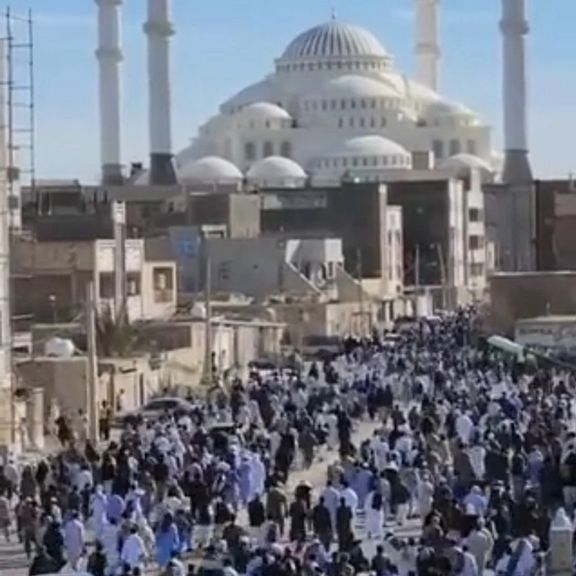
As is the new normal in Zahedan, where Abdolhamid leads the Friday prayers, people held demonstrations after they left the mosques on Friday and chanted slogans against the Islamic Republic and its ruler Ali Khamenei. Similar rallies were held in another city of the province, Khash.
However, over 1,300 kilometers north of Zahedan, in Golestan province where there are large Sunni Baluch and Turkmen communities, another Sunni Mowlavi (Imam), Mohammad-Hossein Gorgij, has reportedly been put under house arrest. People held a gathering outside the residence of Gorgij and expressed their support for him.
Also on Friday, the security situation was tense in several Kurdish cities, which are predominantly populated by Sunni people, such as Sanandaj in Kordestan province and Sardasht in West Azarbaijan. People were not allowed to visit their cities’ graveyards as the security forces are afraid that any gathering can morph into antigovernment protest rallies.
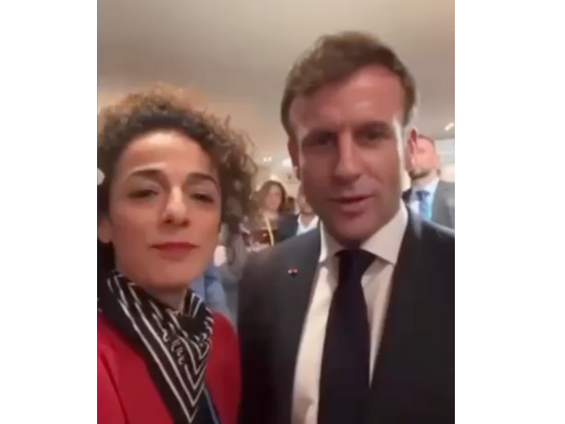
The French president has praised a united front among eight leading Iranian opposition figures formed earlier in February, promising to meet with the united group.
Three members of the group, Prince Reza Pahlavi, Masih Alinejad and Nazanin Boniadi are participating in the Munich Security Conference, while Iranian officials have not been invited.
On the sidelines of the conference Emmanuel Macron had a friendly encounter with women’s rights activist Masih Alinejad, one of the eight dissident figures.
During the short conversation, a video of which was published in Alinejad’s twitter account, Macron said that “I want to congratulate you and all the members of the coalition for joining and teaming up nicely to support.”
“To us and the civil society, what's happening in Iran is very important. And I'd be very happy to meet all of you, altogether because this message of unity is important,” he added.
Alinejad told Macron that leaders of leading countries are calling the current wave of antigovernment protests across Iran “a revolution,” adding that “France is all about revolution, and you're going to be the voice of Iranian women.”
Also on the sidelines of the first day of the Munich Security Conference, Prince Reza Pahlavi told reporters that “I think when you have a true democratic system, every demand or expectations that people living in that country will have would have to be addressed by the rule of law and guarantee of freedom and equality, and no discrimination of any form.”
He added, “I hope our Constitution in the future will be based on the Universal Declaration of Human Rights which by default would immediately address so many expectations and of course many more that we could address based on our alliance and work today on a Charter and hopefully build that into the equation in the future.”
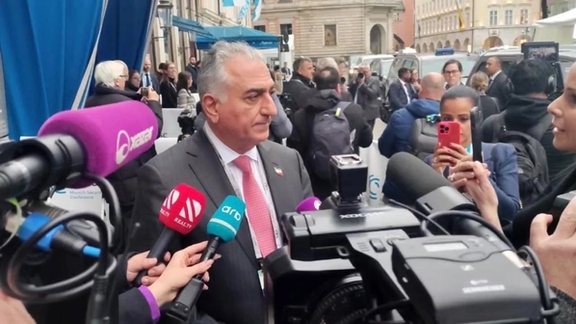
The organizers of the annual forum, which draws together senior foreign and defense officials, have not invited the Iranian government to this year’s event, citing “the current political situation” in the country. Many Iranians residing in the city also held a gathering outside the venue of the event on Friday supporting the three leading figures at the conference. Protesters in Iran and opponents abroad see the decision to invite dissident leaders as a big victory for the protest movement that began in September after Mahsa Amini was killed in ‘hijab police’ custody.
During the three-day event, a panel will be held on Saturday titled “Woman, Life, Freedom: Visions for Iran,” in which Alinejad, Pahlavi and actress and activist Boniadi will participate. US Senator Robert Menendez, the Chairman of the Senate Committee on Foreign Relations and Member of European Parliament Hannah Neumann are also among the panel. Suzanne Maloney from The Brookings Institution and Karim Sadjadpour from the Carnegie Endowment for International Peace will be the moderators of the event.
Since a historic forum in Washington was held earlier this month with four of the eight opposition figures in attendance, and four others sending video messages, the dissident activists have been participating in events around the world to make the voice of the Iranian opposition heard. Such events signal the emergence of a leadership council in the diaspora to campaign for international support in favor of Iran’s protest movement.
Alinejad and Canada-based activist Hamed Esmaeilion, whose daughter and wife were killed in the shooting down of Flight PS752 downed by Iran’s Revolutionary Guard in 2020, are also scheduled to deliver speeches at the Italian Senate about the current wave of the protests in Iran. They are also set to attend a gathering against the Islamic Republic in the capital Rome the following day.